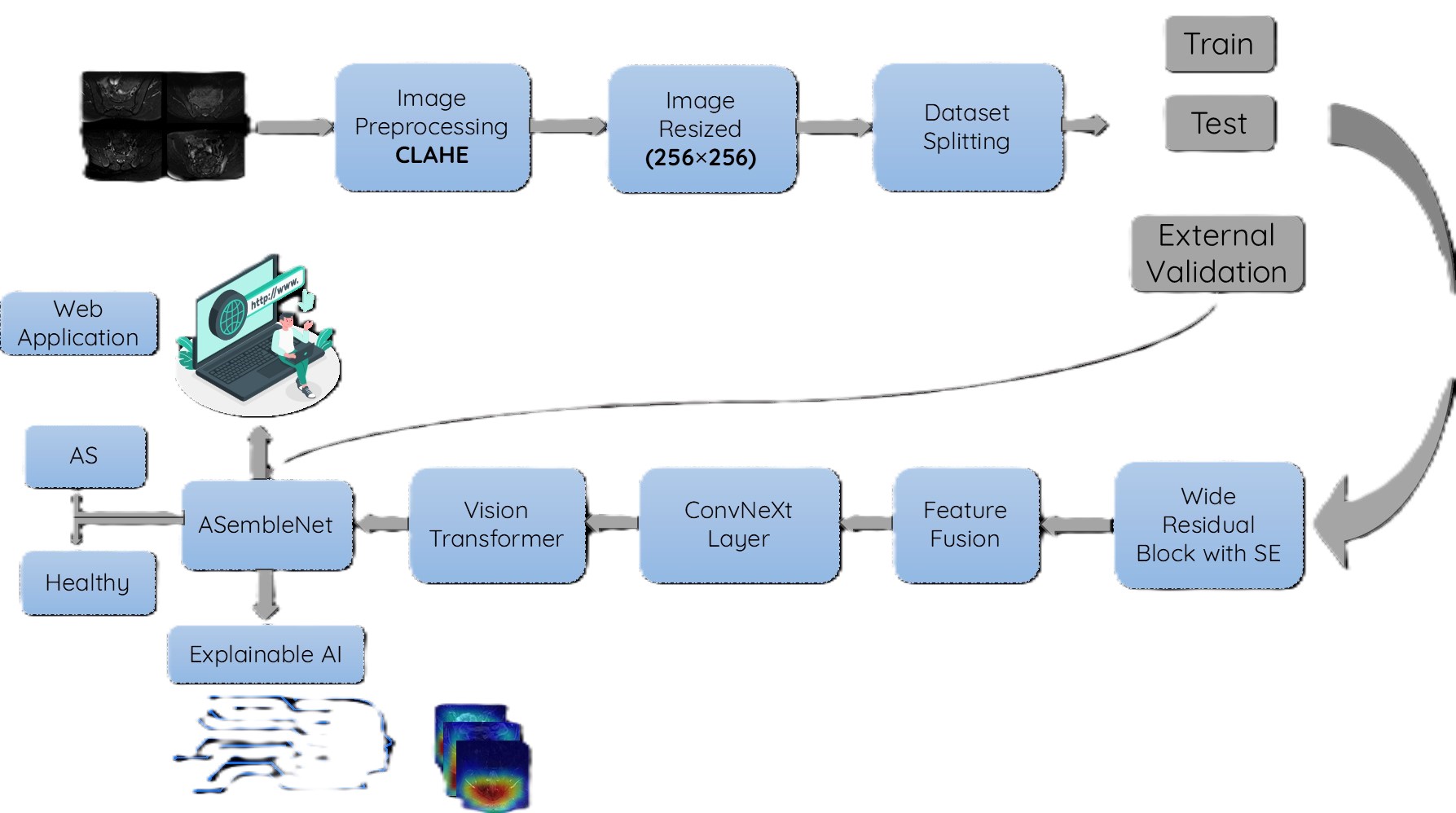Session Information
Session Type: Abstract Session
Session Time: 4:15PM-4:30PM
Background/Purpose: Ankylosing spondylitis (AS) is a progressive inflammatory disease with delayed diagnosis due to subtle early imaging findings. We present ASembleNet, a deep learning model integrating convolutional and transformer-based architectures for accurate AS classification on MRI. The model was developed using multi-institutional, publicly available datasets and externally validated with expert-reviewed cases.
Methods: Three datasets were used for model development. Dataset 1 consisted of 4,115 axial and coronal MRI images from AS patients and healthy controls collected at Elazığ Fethi Sekin City Hospital (2018–2023). Dataset 2 included 213 expert-annotated MRI images from the Assessment of Spondyloarthritis International Society (ASAS) Online Case Library for external validation. Dataset 3 comprised 102 normal MRIs sourced from Radiopaedia.org to augment healthy control data. All images underwent standardized preprocessing: cropping of artifacts, resizing to 256×256 pixels, and contrast enhancement via CLAHE. ASembleNet architecture (Figure 1) combines wide residual blocks, ConvNeXt layers, and Vision Transformer encoders with Squeeze-and-Excitation modules for attention calibration and Grad-CAM for interpretability. The dataset distribution is detailed in Table 1. Training-validation split ensured ASAS cases were used solely for external testing. Performance metrics included accuracy, precision, recall, F1-score, AUC, and confusion matrix analysis.
Results: ASembleNet achieved 99% classification accuracy for coronal MRI and 98.13% for axial MRI, outperforming Xception, ResNet50, and InceptionV3 models. The model consistently showed high sensitivity and specificity across all classes. External validation on ASAS cases confirmed generalizability. Model performance across architectures is summarized in Table 2. Grad-CAM visualizations demonstrated clinically relevant feature localization, aligning with expert interpretations. A publicly accessible web-based platform was developed to facilitate real-time AS classification by clinicians.
Conclusion: ASembleNet demonstrates high accuracy in detecting AS on MRI using a hybrid deep learning approach trained on diverse, real-world datasets. Its strong performance on external validation and integration with explainable AI tools underscore its potential as a reliable clinical decision-support tool for early AS diagnosis.
 Methodology of our proposed model
Methodology of our proposed model
.jpg) Table 1: Dataset distribution for axial and coronal MRI from three public sources.
Table 1: Dataset distribution for axial and coronal MRI from three public sources.
.jpg) Table 2: Performance comparison of ASembleNet and other deep learning models.
Table 2: Performance comparison of ASembleNet and other deep learning models.
To cite this abstract in AMA style:
Gharib M, Khandakar A, Ayari M, Al emadi S. ASembleNet: A Hybrid AI Model for MRI-Based Classification of Ankylosing Spondylitis [abstract]. Arthritis Rheumatol. 2025; 77 (suppl 9). https://acrabstracts.org/abstract/asemblenet-a-hybrid-ai-model-for-mri-based-classification-of-ankylosing-spondylitis/. Accessed .« Back to ACR Convergence 2025
ACR Meeting Abstracts - https://acrabstracts.org/abstract/asemblenet-a-hybrid-ai-model-for-mri-based-classification-of-ankylosing-spondylitis/
